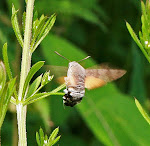March 29-April 7, 2011:
The chalk garrigue lying within a triangle between the villages of Kidasi, Omodhos and Monagri in south-west Cyprus is rich in orchids. Many can be found near the roadside and often there are several different species growing in close proximity to each other. However, within the same general area and habitat there will be many other places where there are none at all, indicating that the conditions there are not exactly correct for these very demanding plants.
At the time of the visit many species were in flower, especially those of Ophrys (‘bee orchids’) with their strikingly spectacular flowers. Between Kidasi and Omodhos there was Ophrys israelatica, Ophrys asiatica, Orchis quadripunctata in two colour forms, Orchis italica and Barlia robertiana.

[Ophrys israelitica]

[Ophry asiatica]

[Orchis quadripunctata]

[Orchis quadripunctata, white form]

[Orchis italica]

[Barlia robertiana]
A chalk roadside near Monagri had Ophrys flavomarginata, O. umbilicata, O. iricolor and, quite surprisingly a few plants of the rare endemic Ophrys kotschyi (perhaps a new locality?).


[Ophrys flavomarginata, both above]

[Ophrys umbilicata]

[Ophrys iricolor]


[The rare endemic Ophrys kotschyi, both above]
A small gorge just south of Kidasi had Serapias bergonii, Ophrys lutea subsp. galilea (=O. sicula) and more Ophrys flavomarginata and Orchis italica.

[Serapias bergonii]

[Ophrys lutea subsp. galilea]
At this site there was also Bellevalia trifoliata (a monocotyledon but not actually an orchid). At Monagri there was another interesting monocotyledon: Gagea fibrosa.

[Bellevalia trifoliata]

[Gagea fibrosa]
Thanks to Yiannis for help with some of the ids.


.jpg)





















